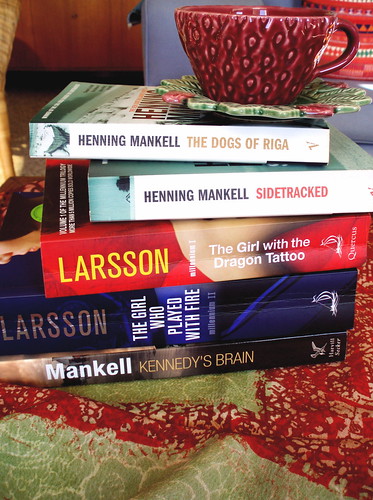
A little late, I've jumped on the Stieg Larsson bandwagon. After many recommendations, I finally got around to reading 'The Girl With the Dragon Tattoo'. It was un-put-downable (though wonderfully large and heavy) and immediately upon finishing it I went out and bought the sequel, 'The Girl Who Played With Fire'. I've been trying, so far unsuccessfully, not to buy new books, but to borrow them from friends or libraries. But the need to continue my Stieg Larsson relationship immediately was beyond reason or denial.
His central character, the Asbergerish savant Lisbeth Salander, has echoes of Carol O'Connell's Mallory, a much earlier enthusiasm of mine. But, with their extensive and varied range of characters, plots and sub-plots, Larsson's books are much richer than an engagement with a single character. His books are political in the best way, where the themes evolve from the drama of the ills of everyday life - violence against women, racism, the sex trade, and prescient stories of corruption in the world of high finance.
Stieg Larsson's own story is almost as sensational as his fiction. A life-long left-wing activist and journalist who campaigned against fascist tendencies and movements, he died from a sudden heart attack at 50, leaving behind the three unpublished volumes of his Millenium trilogy - of which the books mentioned above are the first two installments. Inevitably, given the nature of his life and fiction, all kinds of conspiracy theories have developed around his death.
My reading for the last few months has included not only Stieg Larsson, but also another two Swedish crime fiction writers - newly discovered Asa Larsson, and old favourite Henning Mankell. (As an aside, I 'discovered' Henning Mankell for myself, randomly buying one of his novels in Amsterdam when I was in desperate need of something to read. This was just before his works were widely distributed and I've always felt some pride that I'd begun reading him before he became famous. Aren't the things you take pleasure from odd?)
On the web I found a recent article by John Crace from 'The Guardian', musing on the rise in popularity of Scandinavian crime fiction, and providing me with a most useful list of other writers I've not yet read. Crace writes most interestingly about the intersection of translation and publishing and how this inevitably affects what becomes popular, but he also speculates that the reason for the current popularity of Scandinavian fiction is that it is exotic - as he says 'It's this sense of the other that sets them apart'. I'm not sure that I agree with him - it depends what he means by 'the other'. He may reflect a British sense of what constitutes 'the other', but as an Australian, Swedish crime novels are no more exotic for me than fiction set in Ian Rankin's Edinburgh. In some ways, they are less exotic because I've visited some of the locales of Stieg Larsson's and Mankell's novels, but I've never been to Edinburgh. What I particularly like about the Swedish crime fiction I've read is that it's deeply rooted within the values and patterns of the community and society from which it derives. Maybe this is what Crace means by 'the other'.
I've also discovered that the BBC has made a series based on some of Mankell's novels with Kenneth Branagh as the gloomy but admirable detective, Wallender. So, we still have this to look forward to in Australia. I loved the Swedish TV series of the books which we saw on SBS - dark and disturbing - so Branagh and the BBC will have a high standard to live up to.
Anyway, enough of blogging. I have to finish 'The Girl Who Played With Fire'.
1 comment:
Since I started knitting again (and became obsessed) I rarely read books. And I miss them. I must start again - would never have thought of Swedish crime fiction, but it sounds great!
Post a Comment